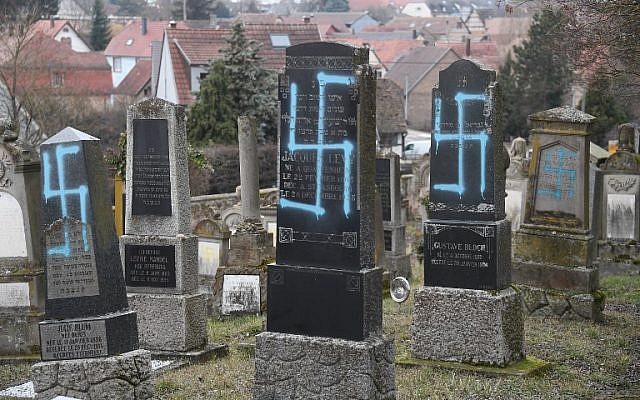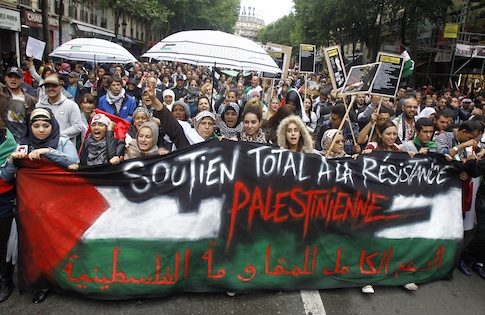
“Happy like a Jew in France.”
This slogan was once the refrain of many persecuted Jewish communities in Europe, who saw the French nation as a haven for the “people of the book.” France was the first European country to emancipate the Jews, granting them citizenship and equal rights. Napoleon himself saw the Jewish nation as compatible with French culture, and facilitated their integration by creating a central religious unit: the Israelite Central Consistory of France.
The Dreyfus affair — as abhorrent as it was — also revealed France’s affinity for the Jews. In its aftermath, the country debated vigorously about the corrupt trial and debasement of the Jewish captain. The French anthem “La Marseillaise” is one of the Chabad movement’s classics, and French-Jewish citizens pray for their Republic every Saturday.
Yet today, France is seen as the cradle of antisemitism in the West.
When Alain Finkielkraut — a distinguished French-Jewish academic — approached a protest initiated by the now famous “Yellow Vest” movement in Paris on February 16, he attracted their wrath. They told him to “go back to Tel Aviv” and shouted “dirty Zionist.”
This marked just one of countless antisemitic acts committed in France over the last two decades. According to the Anti-Defamation League, France is the second most antisemitic country in Europe, with around 37 percent of the population subscribing to anti-Jewish stereotypes, according to figures from 2015.
This reality has been manifested in unspeakable hate crimes against Jews since the 2000s, which have ranged from verbal slurs to heinous murders, such as the brutal torture and assassination of Ilan Halimi.

How Did we Get Here?
Throughout the 2,000 years of Jewish diaspora, antisemitism has always followed one simple rule: namely, despair. Whenever economic, social, or even health crises arise, antisemitism soars almost mechanically. This is true for the Black Plague, the Spanish Inquisition, the Russian pogroms, the 1929 stock market crash, and many other cases.
While antisemitism is not caused by despair, it relies on this sentiment in order to spread even further. And this is one of the main factors underpinning the rise of antisemitism in France over the last few decades.
France’s predicament has been marked by high unemployment and low growth, driven by the inability of successive governments to reform. Stuck in this system, growing fringes of French society have become increasingly neurotic and sensitive to conspiracy theories and populist rhetoric.
The mainstream media and political actors have historically been prone to denounce “old school” antisemitism from the far-right, embodied by the legacy of the Vichy regime and Jean-Marie Le Pen. And rightly so. Yet, it was only recently that the general public started to realize that antisemitism — usually hidden behind the cover of anti-Zionism — had pervaded far-left parties such as Jean-Luc Melenchon’s La France Insoumise. Similar to Jeremy Corbyn’s Labour, the far-left fringes in France have traditionally been very ambiguous about the legitimacy of the State of Israel.
Yet notwithstanding the far-left and far-right’s responsibility for the rise of Jew-hatred in France, all the recent murders of Jews there have been the result of one singular ideology: radical Islam.
France has a population of approximately 67 million people, six percent of whom are Muslims and are mostly ethnically and culturally Arab. While Arab French citizens don’t all hold prejudice against Jews, antisemitism — exacerbated by intolerance towards Israel — unfortunately pervades Arab culture in France.
Today, around 74 percent of the Arab world is believed to hold anti-Jewish opinions. The vast majority of Arabs in France descend from immigrants who arrived in the country at a time when hostility towards Israel was the norm, especially in Algeria, where Jews were forced to flee during the 1962 Algerian independence war due to fear of pogroms. Unfortunately, swathes of modern French Arabs are still under the influence of this history.

In 2014, massive anti-Israel protests erupted in Paris during Operation Protective Edge. Thousands of French Arabs claimed to care for their “Palestinian brothers,” who were under siege by Hamas. Yet despite the massacre of hundreds of thousands of innocent Syrians by Bashar al-Assad, the proliferation of totalitarian Islamism in Iran, and the violation of democracy and human rights in nearly all Arab countries, no protest or march has come close to those orchestrated to condemn Israel.
Worryingly, according to the Institute Montaigne, 28 percent of Muslims in France abide by ideologies supported by radical Islam. This ideology led Mohamed Merah to assassinate three children and one rabbi in a Jewish school in Toulouse in 2012, and Amedy Coulibaly to hijack a kosher supermarket in 2015, killing four people.
Together with a hostility towards the State of Israel, and the complacency of far-left groups who refuse to use the term “Islamist” when commenting on terror attacks, antisemitism has become accepted by some on the left of the political spectrum. This is especially true within French academia, where Jewish students are being intimidated and their religious institutions ransacked.
Antisemitism in France will not go away of its own accord. As long as there is rampant economic and social insecurity, furthered by the scourge of militant radical Islam, it will continue to fester. Tackling antisemitism in France will require widespread societal change.
Originally published in The Algemeiner.
Contributed by 2018-2019 King’s College London CAMERA Fellow Simon Moos.
